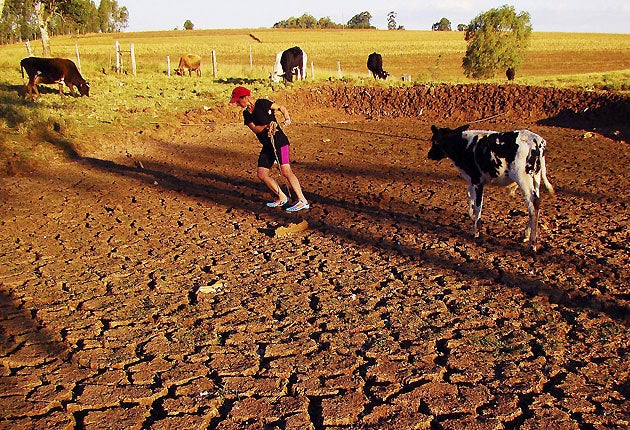Eliot Whittington: Polluters must pay
Those who warmed up the planet must pay to cool it down

If December's Copenhagen climate conference were a person, then would they be heading for a nervous breakdown triggered by the overwhelming burden of expectations, or excited by the key role they've been given?
This year is crunch time for dealing with climate change, but who will pay to do so? Christian Aid believes that the bill should be divided up on the basis of countries' responsibility for climate change and their ability to pay.
Responsibility lies overwhelmingly with industrialised countries, which have polluted their way to wealth and power and are responsible for the vast bulk of emissions in the atmosphere. Even now, our emissions per person (UK 10 tonnes a year, US 20) still dwarf other people's (China 4 tonnes, and Bangladesh a tiny 0.3).
But, in a glaring injustice, it is people in developing countries who are worst affected. Because they are poor, they are least able to cope with the rising sea levels and more frequent floods, droughts and hurricanes that climate change is already causing.
Huge numbers depend on agriculture to get by – their livelihoods are destroyed when rains fail to fall, or come irregularly. And their governments have least resources to help when, for instance, drought ruins crops or cyclones wreck homes.
Developing countries are angry. Angelica Navarro, Bolivia's lead climate negotiator, told a meeting in London this summer that the glaciers which supply water to her country's main cities are melting, causing floods and forcing people out of their homes.
She said: "Bolivia has 0.27 per cent of carbon emissions. Developed countries, with less than 20 per cent of the world's population, put up three quarters of the historical emissions in the atmosphere. We did not cause this. We cannot stop this. I want my atmosphere back. I want it the way it was. How you do it, developed countries, is your problem."
As for ability to pay the climate bill, we must again look to the industrialised world. Developing countries are still struggling to provide basic services such as clean water, sanitation, health care and education. They should not be expected to divert scarce resources to tackle a crisis they did not cause.
So in Copenhagen, the onus is on the likes of the EU, US, Canada and Japan to start paying. If we divide the bill up on the basis of responsibility and capacity, then developed countries should end up paying around three-quarters.
There are three major items on the bill. First, there is the cost of mitigation – efforts to reduce emissions. Rich countries with high emissions will need to do most of the work but to achieve the deep global cuts needed, they will also need to fund mitigation in developing countries.
Second is technology transfer, ensuring that poor countries are able to use clean technologies – such as renewable energy equipment and carbon capture and storage systems – to tackle global warming.
Third, there is the cost of adaptation. This includes engineering projects such as dams and sea defences, the introduction of crops which cope better in dry conditions, and preparation for more frequent hurricanes and floods.
Christian Aid estimates that on the basis of responsibility and capacity, rich countries owe developing countries at least $150bn a year – significantly more than the $100bn that Gordon Brown has said is needed. The sum should be divided between rich countries on the basis of their historic emissions and current income per person, as set out in the Greenhouse Development Rights framework.
In return for financial and technological help, poor but rapidly industrialising countries such as China, Brazil and India should agree to have the principles of responsibility and capacity applied to them in future agreements.
Moral obligations aside, why should rich countries agree to stand the bill for now? And why should they break with tradition and actually keep their climate-funding promises?
At the G8 meeting in July, Barack Obama summarised the situation well when he said: "Developing nations want to make sure they do not have to sacrifice their aspirations for development and higher living standards, yet with most of the projected growth in emissions coming from these countries, their active participation is a prerequisite to a solution."
Obama was right. But will he and his rich-country friends remember his words in Copenhagen?
Eliot Whittington is Senior Policy Advisor on Climate Change, Christian Aid
Join our commenting forum
Join thought-provoking conversations, follow other Independent readers and see their replies
Comments
Bookmark popover
Removed from bookmarks